Report from United Europe’s seventh Young Professionals Seminar in Arosa, Switzerland, from June 17-19, 2016
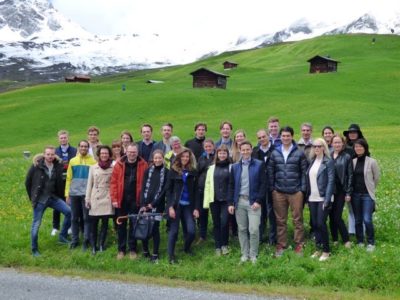
Entrepreneurship has many meanings. It’s narrow definition is obviously about setting up your own business. In a wider sense, it describes taking the initiative, a willingness to take risks, and to follow your own ideas. Seen in a positive light, it is about creating jobs and adding to the economy. The negative view often identifies entrepreneurs as people whose actions are purely governed by a greed for money.
Europe is a large and diverse place, and so it is no surprise that views of entrepreneurship differ widely by geography, by political and economic experience, and by social attitudes. This is why the participants of United Europe’s latest Young Professionals Seminars, a group of 28 young people representing a total of 17 nations, started their debate on “The Spirit of Entrepreneurship” by comparing different meanings of the word.
Yet despite the different meanings, more entrepreneurship is urgently needed in Europe. Fostering new ideas and building new companies is the only way that this continent with its ageing, risk-averse population can remain competitive in the future.
Seed capital from petty smuggling
How can it be done? What are the roles of the state, of society as a whole, of companies and of individuals? What can we learn from history and from the experiences of other regions in the world? These were the questions that we tried to find answers to in Arosa. For a day and a half of intensive debate, participants shared their experiences and insights from a great variety of professional backgrounds.
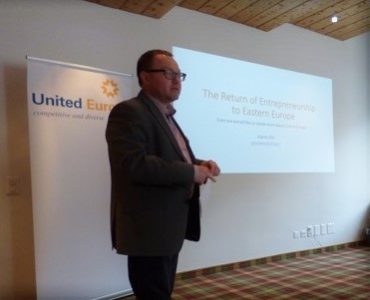
The introductory speech was given by Martin Ehl, a Czech journalist and university lecturer, who explained how after the end of the socialist rule, Central and Eastern Europe had rediscovered entrepreneurship. “For the first time in history, the region is now allowed to have third decade of entrepreneurship,” he said in reference to the turbulent 20th century.
Ehl also described the roots of the first generation of entrepreneurs in Central and Eastern Europe who became successful after the fall of the Berlin Wall. They were people who had made their money through petty smuggling or exchanging currencies. And after 1990, they could use that capital to set up their own businesses. Others had been well-connected within the ruling communist parties and able to take advantage of their contacts and information sources to become rich.
It was only recently, Ehl said, that a new generation of entrepreneurs had started to come up. Entrepreneurs, who built up their businesses from scratch. These positive examples were helping to improve the public image of business and entrepreneurship in Central and Eastern Europe.
Our heartfelt thanks to the supporters of the seminar
It is these fascinating insights into different European regions, and the resulting discussions and conclusions, that make United Europe’s Young Professional seminars such a unique experience for all participants. And it is thanks to our supporters that we are able to offer these seminars now in the third year running.
Our thanks therefore goes to Prof. Roland Berger, founder and honorary chairman of one of the world’s biggest consultancies, as well as a founding member of United Europe, who supported the seminar in Arosa with a generous personal donation.
Many thanks are also due our other kind supporters in Arosa: UBS, the world’s largest global wealth manager, and Senvion, a leading international manufacturer of wind turbines headquartered in Northern Germany. And last but in no means least, our heartfelt thanks also goes to the Hotel Kulm which hosted and fed both speakers and participants splendidly.
As at earlier United Europe seminars, participants were asked beforehand to prepare a short contribution focusing on a particular aspect of the topic. In four working groups, these contributions were then assembled and summarised – a work that took all of the afternoon of Day 1, leading to intensive discussions in various corners of the spacious Hotel Kulm.
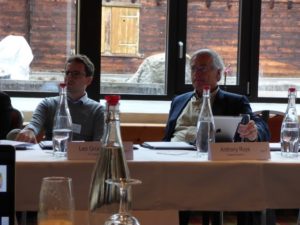
The Arosa seminar was again mentored by Anthony Ruys, former CEO of Heineken and Vice-President of United Europe. It was Ruys who had originally put forward the idea of seminars for young Europeans, as Europe’s future success lies with them. With his eminent business career, he was a particularly important interlocutor in Arosa. The United Europe team also consisted of Jenny Paul and Bettina Vestring.
Day 2 started with another guest speaker, Leo Grünstein, a serial investor and co-founder of several world-class start-ups who explained what he sees as success factors for entrepreneurs. “Be brave,” Grünstein began. “Understand how much risk you are willing to take. Be patient: everything takes longer and is more expensive than you know. And be OK with ambiguity, with not knowing how things will turn out.”
Perhaps the most important piece of advice that Grünstein gave concerned failure. “Failure is really hard. Your self-esteem breaks. At least your first start-up should be a success.”
Does the welfare state help or hinder?
Grünstein also spoke about the hurdles that entrepreneurs encounter in different countries. Doing business in Europe was slightly harder than elsewhere, he said; more difficult for instance than in the US or Africa and Asia. Yet Europe’s markets were loyal and rewarding, allowing companies to build great brands. “I would love for Europe to own more great companies,” Grünstein said. “But the great corporates need to wake up. In the US, corporates are investing in the things that threaten to disrupt us.”
Then it was the first working group’s turn to present results from their discussion on “Facts about Entrepreneurship”. Denmark, thanks to its good education system, an easy regulatory framework for new businesses and a generally entrepreneur-friendly culture, rated as the best place in Europe to set up your own business. On the other end of the scale was Croatia due to heavy regulation, wide-spread corruption and – most importantly – a strong decline in the level of perceived opportunities.
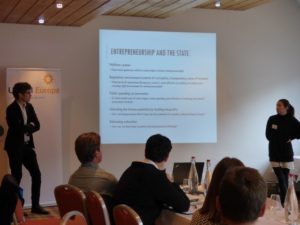
Working Group Two had been looking at “Entrepreneurship and the State”. One of the central issues here was the role of the welfare state: does it encourage or hinder entrepreneurship? If you don’t need to take risks because your essential needs are being provided for, do you forget how to do so?
Or does it work the other way round? Could it be that a welfare system actually unlocks your creative, entrepreneurial potential, because you do not need to worry so much about things going wrong? With Switzerland’s recent referendum on introducing a basic income (rejected by a wide margin), this debate is gaining momentum. Yet so far, the data available are inconclusive, according to Group Two’s research.
The issue with bankers’ bonuses
The debate then continued in a different format. Jan Riem, a young entrepreneur with French and German roots, gave a short presentation on the Austrian economist Joseph Schumpeter. His theory of “creative destruction”, Riem explained, provided a much better foundation for analysing the effect of technological change on entrepreneurship, because Schumpeter did not take a static view of the economy.
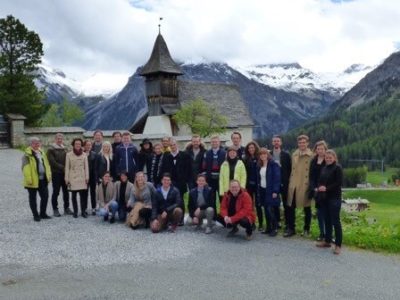
There was just enough time before lunch for a short – but steeply uphill – walk through the beautiful alpine landscape around Arosa. At 1800 meters above sea level, the Hotel Kulm is surrounded by majestic peaks, ideal for a photo opportunity.
After lunch, it was time for Working Group Three to present its results on “Entrepreneurs and Attitudes”. The group had concentrated on attitudes towards taking risks. “Is an individual who is prone to taking risks more likely to start a business? And is an entrepreneur who is prone to taking risks more likely to succeed?” Clearly, there are no easy answers here, but the questions are certainly worth pondering over.
Vera Eigenmann, a young Swiss banker, took her turn next with another short presentation. She focused on examples where an entrepreneurial spirit may prove harmful to society. One example was excessive bonuses for bankers. Faced with huge incentives – but not with corresponding penalties for bad decisions – bankers incurred too many risks. Similarly, Eigenmann said, some start-up companies in Silicon Valley were encouraged to take too many risks by investors giving them easy access to far too much money.
Five points to foster entrepreneurship
Working Group Four had looked at “Entrepreneurs and Society”, focusing on issues of education, demographics and innovation. “We face the challenges of an ageing population and of slow growth,” the group concluded. “Who are the key players, who could foster entrepreneurship and growth? We should make much better use of the potential of women, immigrants and older people.”
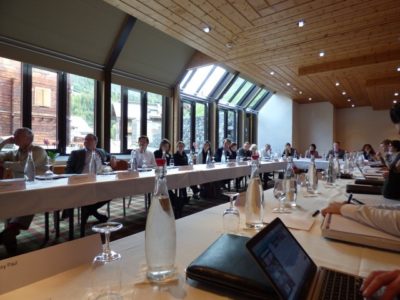
Every working group report was followed by a lively debate involving the entire group. So when it was time to start working on a list of conclusions of the seminar, there was little hesitation. Again, participants split up into four working groups, but in a different constellation than before. The groups then had an hour to put together a list of proposals for fostering entrepreneurship in Europe.
Interestingly, all four groups came back with very similar points. It seemed that after a day and a half of discussing entrepreneurship, participants had really come together in their analysis. In a happy side effect, this made it much easier to draw up the final list of conclusions. Five central points were identified: raising awareness of the importance of entrepreneurship for Europe’s future, improving education, streamlining regulation especially for new businesses, investing into better infrastructure and making funds available more easily for start-ups.
A wonderful ending
It was a good result for a very intensive session, but the Arosa programme still wasn’t quite over yet. Just before dinner, one of the participants treated everybody to a particularly fine example of entrepreneurship: AyseDeniz Gokcin, a professional pianist from Turkey, gave a short concert.

In her introduction, she explained how she had been inspired by the example of the composer and pianist Friedrich Liszt, historically one of the first showmen in music. Thanks to social media and the internet, AyseDeniz today was successfully doing something very similar: building her own brand and marketing her skills herself to gain independence from the labels.
And what a splendid way to end a wonderful seminar!
Photos: Jenny Paul


